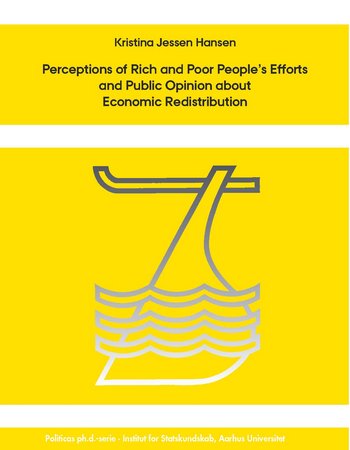Kristina Jessen Hansen
Perceptions of Rich and Poor People’s Efforts and Public Opinion about Economic Redistribution

Should economic resources be redistributed from rich to poor? This dissertation advances our knowledge about public opinion formation about this key political question. A central finding in the literature is that citizens deem inequality fair and oppose economic redistribution if they believe that individual effort determines people’s economic positions in society. However, this finding is mostly based on studies on the perceived efforts of the poor. In particular, research has shown that the so-called deservingness heuristic prompts people to consider if the poor make an effort to deserve help when they form attitudes about welfare. In contrast, little is known about how people form opinions about “taking from the rich”. The dissertation contributes a novel theory to understand the decision-making mechanism that shapes such opinions. Based on experimental and observational survey data from Denmark and the United States, the findings suggest that people, when forming attitudes about taxing the rich, are more concerned with their warmth than with their efforts and that the emotions admiration and envy are important. The findings also suggest that perceptions of poor people’s efforts are more consequential for attitudes about redistribution than perceptions of rich people’s efforts. Finally, the dissertation identifies individual-level moderators that influence the extent to which citizens’ redistributive preferences are responsive to cues reflecting if people are poor and rich because of (lack of) effort or (un)fortunate circumstances. The dissertation appeals to all who are interested in political psychology, economic fairness and public opinion about economic redistribution.
Not available for download
![]() Ophavsretten tilhører Politica. Materialet må ikke bruges eller distribueres i kommercielt øjemed.
Ophavsretten tilhører Politica. Materialet må ikke bruges eller distribueres i kommercielt øjemed.